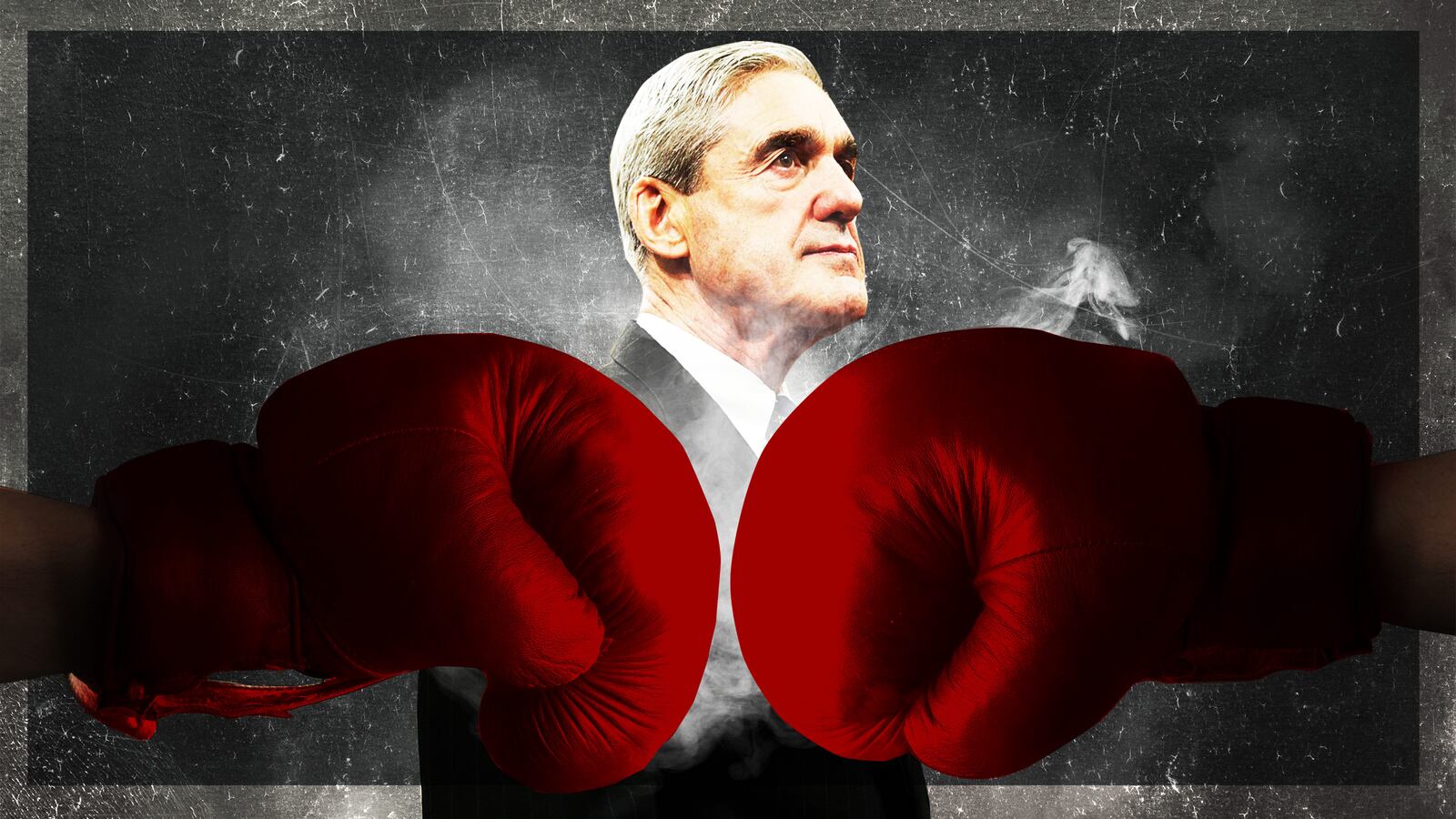Sure, there have been a few nasty tweets, and maybe an over-caffeinated interview or two. But ever since Special Counsel Robert Mueller began investigating the Kremlin’s interference in the U.S. election, Trump World has basically played nice. The White House and the Trump campaign forked over reams of documents. A host of top figures, including senior White House staff, lined up to interview with the Special Counsel—including former White House Counsel Don McGahn, who sat with Mueller’s team multiple times. Even the president himself answered written questions (though it appears Mueller still wants more).
Now, Mueller’s team is writing a report detailing its findings, which will go to the attorney general, who will decide whether or not to give it to Congress. At that point, the Trump administration’s conflict with Mueller could burst the bounds of Twitter and show up in court.
A person familiar with the president’s legal team’s thinking told The Daily Beast that Trump’s lawyers expect a complex, multi-faceted process to ensue after Mueller’s team drops its report—potentially involving a legal battle over executive privilege.
This depends on what’s in the report, of course. Rudy Giuliani, the face of Trump’s personal legal team, told The Daily Beast he couldn’t speculate about any potential fights until he sees the report.
“If the report doesn’t deal with sensitive, privileged material, then we probably will have no objection,” he said. “But we can’t know that until we see it, and we can’t know if we’re going to agree to all of it, some of it—there’s no way to know that in the abstract.”
“Maybe there will be no problem,” he said. “Maybe there will be selective problems.”
Selective problems could cause huge fights.
Deputy Attorney General Rod Rosenstein named Mueller as Special Counsel on May 17, 2017. The appointment came just days after Trump fired FBI Director James Comey—a move Trump later said was informed by Comey’s supervision of an FBI counterintelligence investigation into Russian meddling in the 2016 presidential race. In the 19 months since Mueller took over that probe as part of his work as Special Counsel, he has been examining whether Trump obstructed justice, including in his firing of Comey.
The White House was surprisingly cooperative with him in that pursuit. Ty Cobb—then helming the White House’s response to Mueller’s team—decided to let senior White House staffers answer the Special Counsel team’s questions. Cobb and others argued that the president’s executive privilege remained intact despite this, as Mueller’s team is part of the government’s executive branch. If the information White House staffers gave Mueller about their conversations with the president were to leave the executive branch, however, and be shared with Congress, it would violate the president’s executive privilege—at least, that’s what Rudy Giuliani and a host of conservative lawyers have long argued.
This is where things could get messy. Mueller’s report could discuss the question of whether Trump obstructed justice, according to a Washington Post report from April. Any findings on that subject would likely involve testimony by White House officials who heard the president discuss his decision to fire Comey, as well as any efforts to pressure people close to the probe. According to Giuliani, the president has the power to claim executive privilege and bar Mueller from sharing that testimony with anyone outside the executive branch. After all, the regulations governing the Special Counsel only allow him to give his report to the attorney general. The attorney general can then decide whether or not to turn over the report to Congress.
And that’s the million-dollar question, one Trump’s lawyers are bracing for: What happens if the report includes damaging statements from White House staffers about their conversations with the president?
Andrew McCarthy, a former federal prosecutor, told The Daily Beast he believes the Justice Department’s leaders will determine that such comments are subject to executive privilege—and, thus, not available to Congress. He said he believes acting Attorney General Matt Whitaker and Bill Barr, who Trump plans to nominate to the post permanently, would withhold information from Congress that violates this understanding of executive privilege. That could potentially mean redacting portions of Mueller’s report.
“I think it would be likely that the president’s counsel may not even have to tell them to do that,” said McCarthy, a writer for National Review and Fox News who is is deeply influential in conservative legal circles—including those around the president.
“The Justice Department sees as part of its mission the protection of executive privileges,” he continued. “If there’s any existing executive privilege to hold things back, they don’t need Rudy Giuliani to tell them that. They know it better than he does. Part of what the Office of Legal Counsel does is protect the executive branch from what would otherwise be a free-rein encroachment by Congress.”
A Justice Department spokesperson declined to comment, and Barr did not respond to a request for comment.
To be clear, McCarthy’s is far from a consensus view. Neil Eggleston, who served as White House Counsel during the Obama administration, told The Daily Beast he didn’t think this view of executive privilege holds water. And he pointed to U.S.A. v. Nixon, when the Supreme Court forced the White House to turn over tape recordings of Nixon’s conversations to Watergate prosecutors, to support his claim.
“I assure you that nobody thought when they were turning materials and testimony over to Independent Counsel Ken Starr that they remained privileged because he was part of the executive branch,” he added, referring to the team that investigated Bill Clinton’s affair with intern Monica Lewinsky.
And Bob Bauer, who also served as White House Counsel under Obama, said any litigation fight would be doomed for the White House.
“The privilege is qualified and can be overcome by a showing of the Congress’s or a grand jury’s legitimate needs,” he said. “It can also be waived, and the president’s endless tweeting on these subjects, and even more, his lawyers’ memo to Mueller in January of 2018 setting out a presidential waiver, leaves in tatters any belated attempt to resuscitate this claim.”
David Rivkin, a Washington lawyer who held legal positions in the Reagan and George H. W. Bush administrations, disagreed.
“Nothing is entitled to a higher level of executive privilege claim than conversations between the president and his senior White House advisers,” he said. “Of course it’s entitled to executive privilege, and of course an executive privilege claim can and will be upheld, if Congress chooses to push for access to this information in a subpoena fight.”
A decision by the Attorney General to withhold all or part of Mueller’s report will almost certainly mean a legal battle. The most likely party seeking access to the materials would be the House of Representatives, which Democrats will control—and, in particular, the House Judiciary Committee, which Rep. Jerry Nadler (D-NY) is set to chair. Nadler told ABC News last month he would be open to subpoenaing the report if the Attorney General won’t turn it over.
“The committee certainly could subpoena any report Bob Mueller gives to the Attorney General or Deputy Attorney General,” a committee aide told The Daily Beast. “We could also just ask the Special Counsel to come before our committee to share his findings.”
And if the Justice Department defies that subpoena, Nadler’s committee could sue, asking a federal judge to enforce it. That’s where legal fight could turn from ugly to uglier.
“I think Congress would have the upper hand, ultimately,” said Jonathan Turley, a George Washington University law professor who provided expert witness testimony in the Clinton impeachment hearings, and whose writings and cable news commentary draw the attention of Trump’s legal advisers. “But this is not an exercise of legal authority alone; Congress will have to not only watch the existing precedent but the expiring calendar in planning its efforts.”
In other words, embroiling the Democratic House in a lengthy legal battle could also help the administration run down the clock on any potential impeachment proceedings.
But the president’s own prolific social media use could make it slightly easier for Democrats to argue against a potential executive privilege claim.
“These tweets bite him in the ass eight days a week,” said McCarthy. “He himself has said from the beginning, ‘I could stop this anytime I wanted to and I let this investigation go on. Some judge could say, ‘As the president has acknowledged, he could stop this at any point and yet he let all the exchanges happen. It’s too late to unring that bell, he’s waived it.’”








